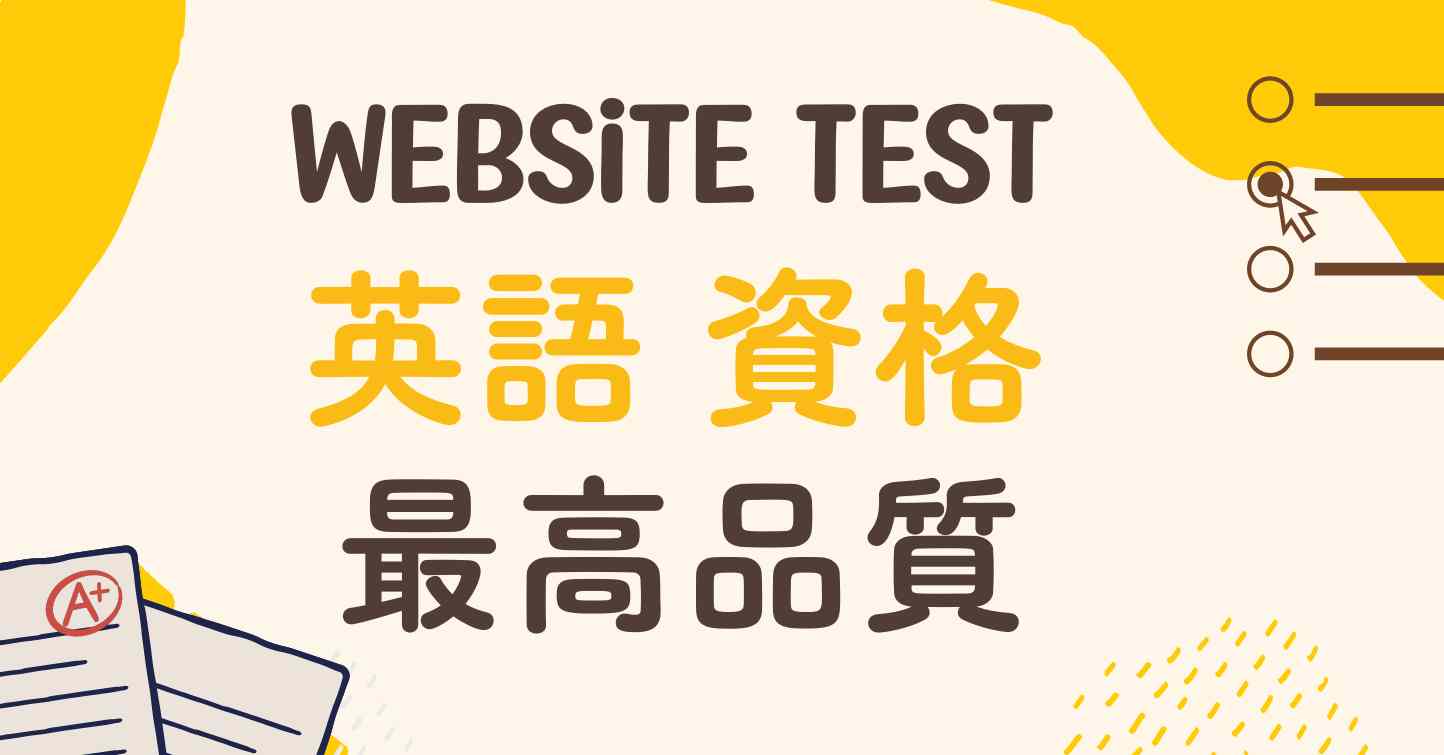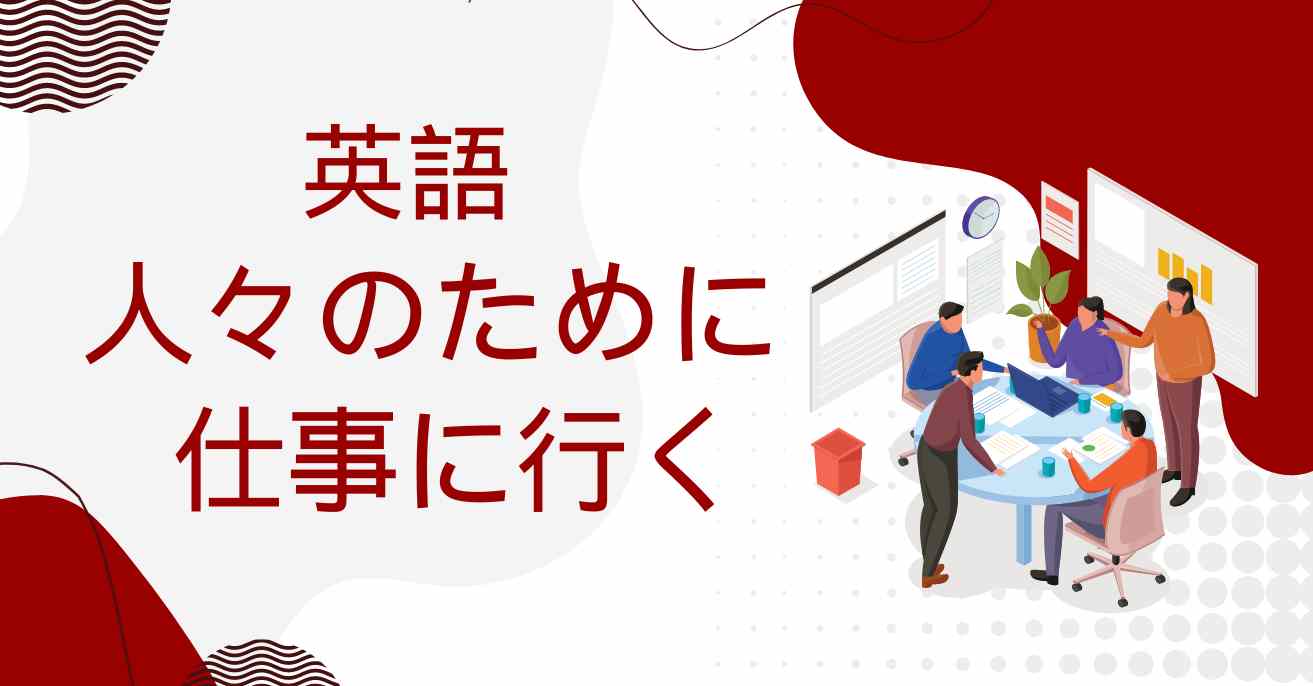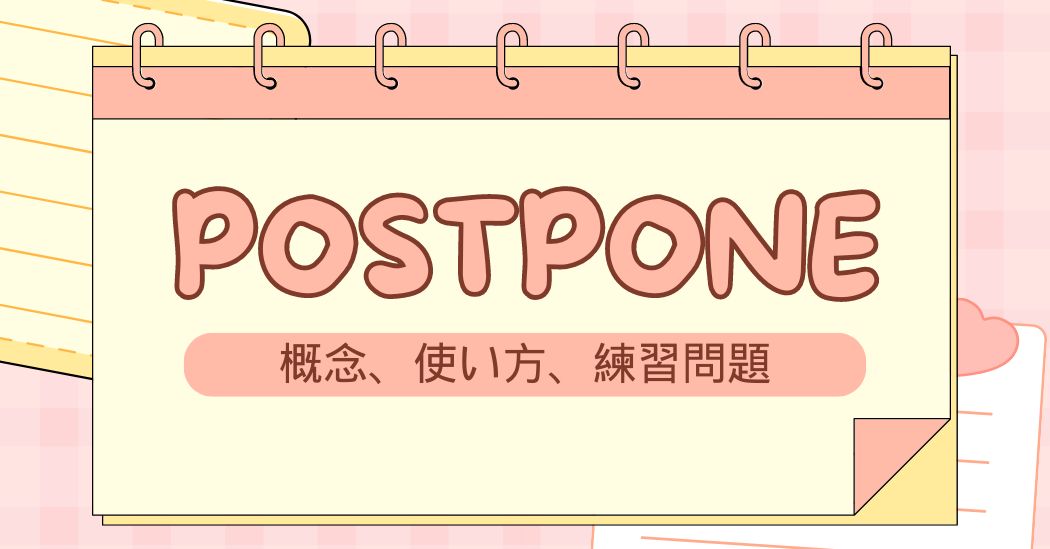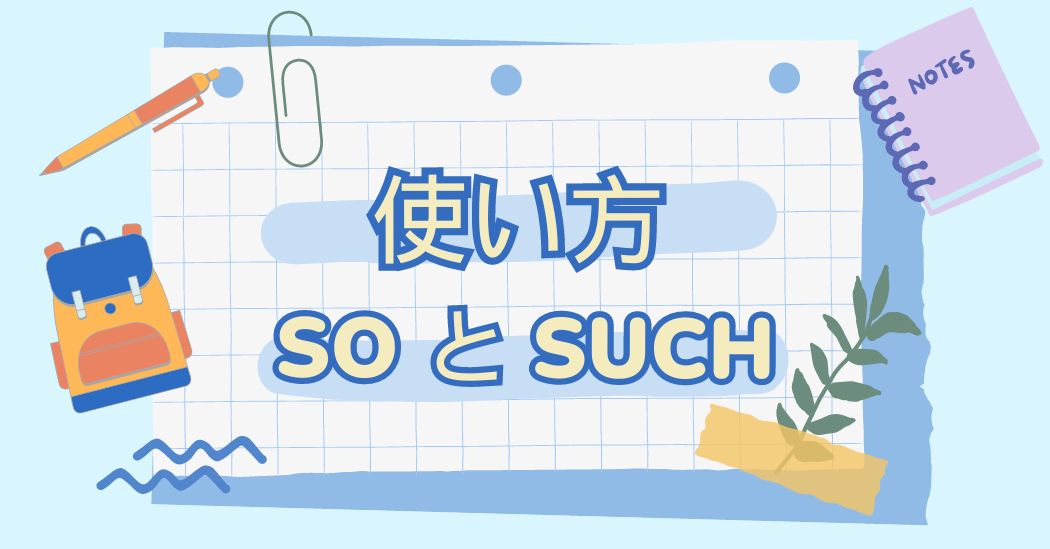英語のイディオムの定義
英語のイディオム(idiom)は、それを構成する個々の単語から直接的に意味を推測することができないフレーズや表現です。むしろ、イディオムの意味は比喩的または文化的なものであり、その意味はその言語と文化に触れることによって学ばれることが多いです。以下に、いくつかの英語のイディオムとその意味の例を示します。
“Break the ice” – 気まずい状況や静かな場面で会話や活動を始める。
例文: “He told a joke to break the ice at the party.” (彼はパーティーで緊張をほぐすためにジョークを言った)。
“Piece of cake” – とても簡単なこと。
例文: “The exam was a piece of cake.” (その試験はとても簡単だった)。
これらのイディオムは、しばしば歴史的または文化的な背景を持ち、英語を学ぶ人々は個々の単語の直訳に頼るのではなく、使用される文脈を通じてそれらを学ぶ必要があります。
英語の諺の定義
英語の諺(proverb)は、経験や民間の知恵に基づいた教訓や助言を含む短く簡潔な表現です。これらは世代を超えて口承され、普遍的な意味を持つことが多いです。以下に、いくつかの有名な英語の諺とその意味を示します。
例:
“Don’t count your chickens before they hatch” – 孵化する前に鶏を数えるな。
意味: 何かが実際に起こる前に、それを確信して期待しすぎるべきではない。
“Honesty is the best policy” – 正直が最良の策である。
意味: どんな状況においても、正直であることが最も良い結果をもたらす。
これらの諺は、貴重な教訓を含んでおり、会話の中で視点や助言を示すためによく使われます。
英語の成句、諺の学び方
成句や諺を会話や文章で使用することで、あなたの英語はより自然で、ネイティブスピーカーに近くなります。以下は、英語の成句や諺を覚え、日常生活やコミュニケーション、仕事、学習で上手に活用するためのいくつかのコツです。
1. 意味と文脈を理解する:成句を効果的に使用するためには、その意味を正確に理解し、適切な文脈での使い方を知る必要があります。
2. 信頼できる資料から学ぶ:辞書、教科書、教育ウェブサイト、または英語学習アプリなどの信頼できる資料を探して、成句を学びましょう。
さらに、英単語学習アプリ「MochiVocab」を使えば、携帯電話で柔軟に辞書を調べたり復習したりすることもできます。MochiVocabは「ゴールデンタイム」メソッドを採用しており、この機能により、学習履歴に基づいて最適な時期を計算し、適切なタイミングで復習通知を送信することで、学習効果を最大化します。
MochiVocabの各単語には次の情報が含まれています:
- 単語の意味
- 発音記号
- 通常の発音(スピーカーアイコン)およびゆっくりした発音(カタツムリアイコン)
- 新しい単語を含む例文
- 例文の意味の翻訳
- イラスト

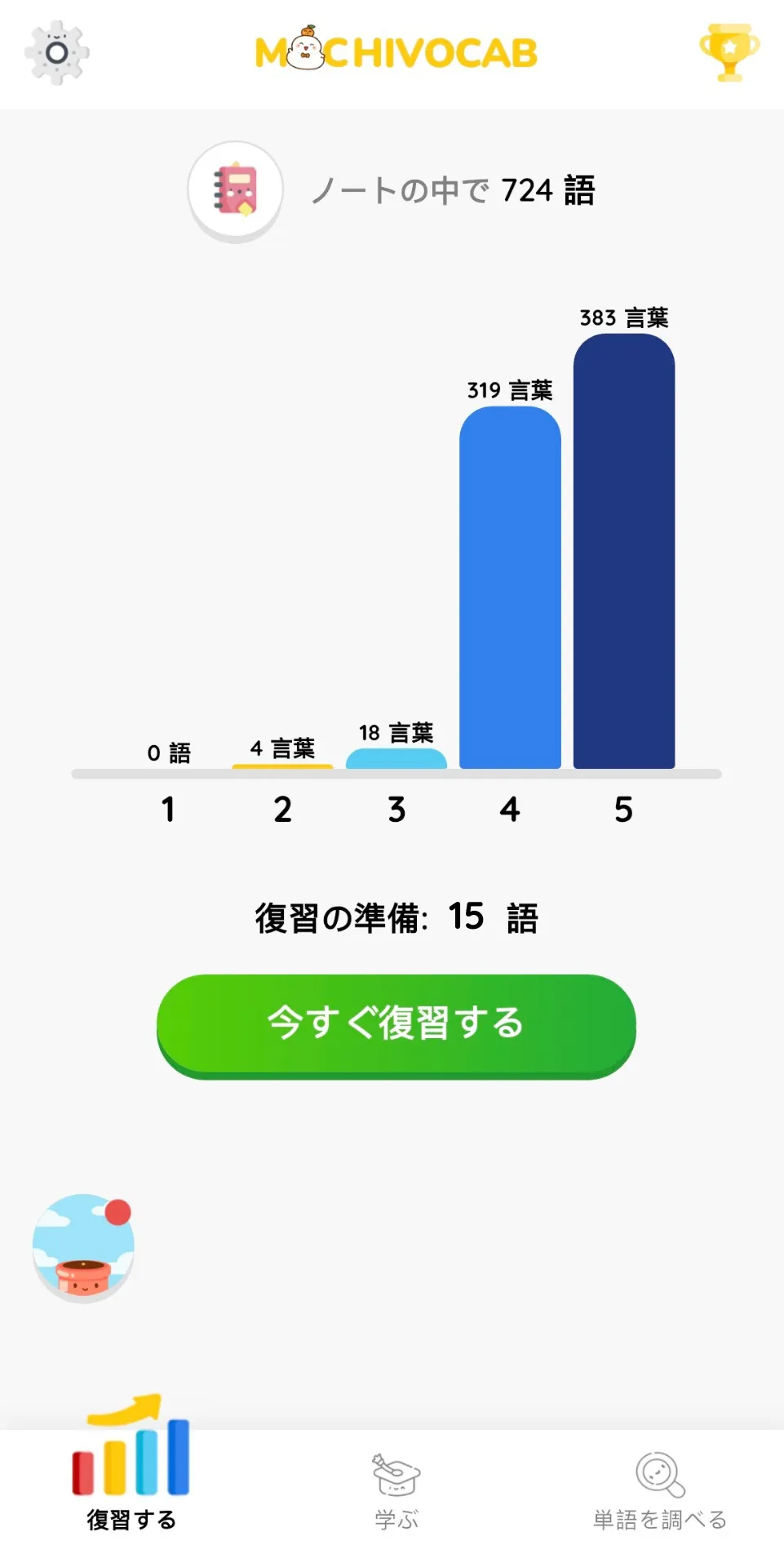
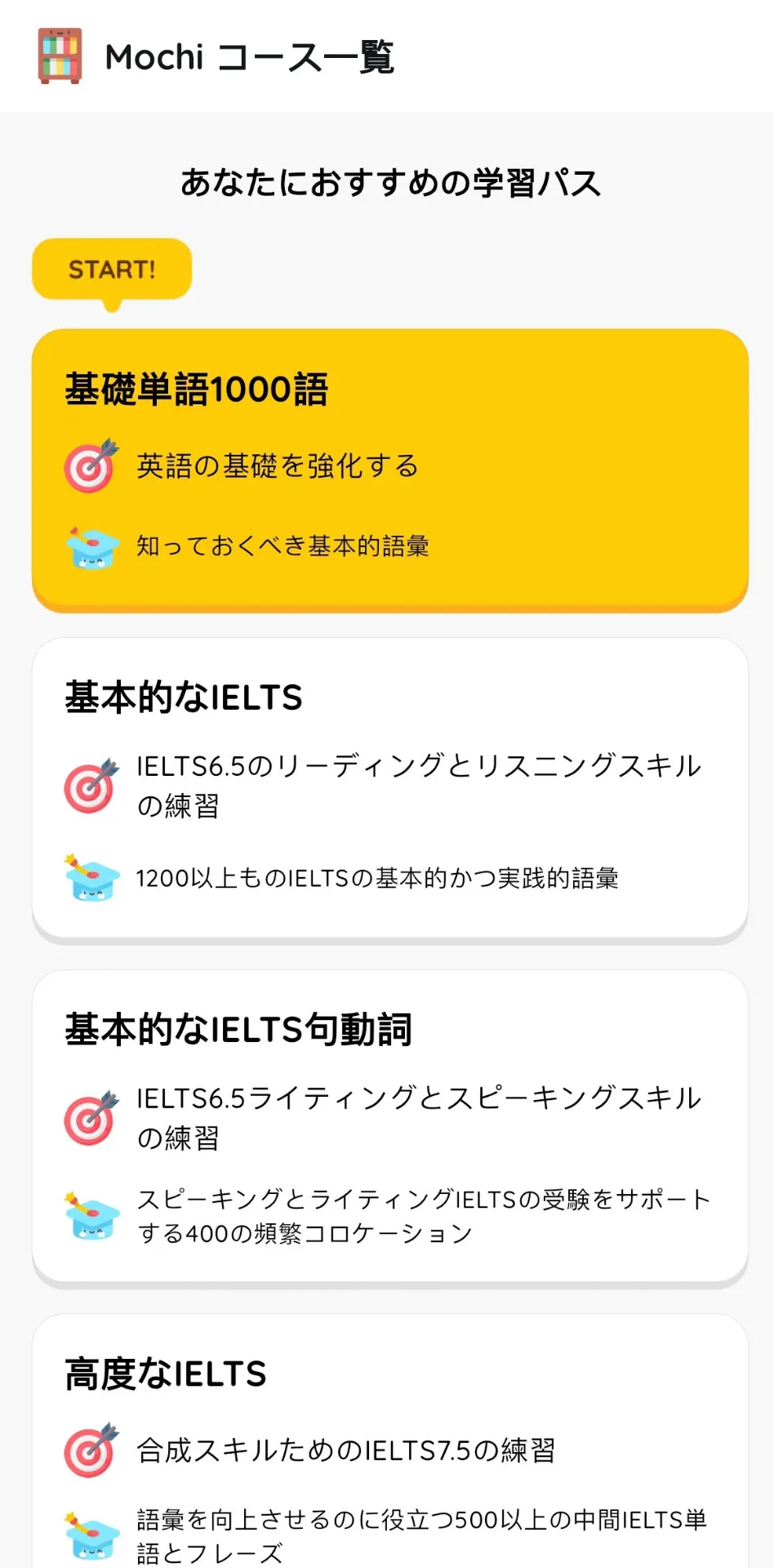
学習結果に基づいて、MochiVocabは学習した単語やフレーズを5つのレベルに分類します。これらのレベルは5段階の記憶レベルに対応しており、アプリは各単語を覚えるまで異なる間隔で復習を促します。これにより、既に覚えた単語の復習時間を減らし、忘れやすい難しい単語に集中することができます。
3. 文脈でのリスニングとリーディング: 映画、テレビ番組、ニュース、書籍などの英語の資料に触れることで、実際の文脈で使われるイディオムを聞いたり読んだりします。
4. 日常会話と文章での使用: 日常会話や文章でイディオムを練習して使うことで、それらを常に心に留め、自然に使う能力を育てます。
5. 定期的な記録と復習: 学んだ新しいイディオムをメモして、定期的に復習することで忘れないようにします。フラッシュカードを作成したり、英語学習アプリを使用するなど、インタラクティブな学習方法を利用します。
6. 多様な文体を読む: 書籍、新聞、雑誌、または専門資料を読むことで、複雑で多様な文脈でのイディオムの使い方に触れます。
使える英語のイディオムやことわざ
- Actions speak louder than words
意味: 行動は言葉よりも雄弁である。
例文: She always says she’ll help, but she never does. Actions speak louder than words. (彼女はいつも手伝うと言うが、実際にはしない。行動が言葉よりも重要だ。)
- Bite the bullet
意味: 困難な状況や痛みを避けずに直面して耐える。
例文: I know this is going to be difficult, but we’ll have to bite the bullet and deal with it. (これが難しいことは分かっているが、私たちはそれに直面して対処しなければならない。)
- Break the ice
意味: 社交の場での緊張やぎこちなさを和らげる。
例文: The jokes he told helped to break the ice and make everyone feel more comfortable. (彼のジョークは場の雰囲気を和らげ、皆をリラックスさせた。)
- Burn the midnight oil
意味: 夜遅くまで仕事をする。
例文: She burned the midnight oil to finish the project before the deadline. (彼女は締め切り前にプロジェクトを終わらせるために夜遅くまで働いた。)
- Cost an arm and a leg
意味: 非常に高価である。
例文: That designer purse may look nice, but it costs an arm and a leg. (そのデザイナーのバッグは素敵に見えるかもしれないが、非常に高価だ。)
- Cut to the chase
意味: 本題に入る。
例文: Let’s cut to the chase and discuss the main points of the proposal. (本題に入って提案の主要な点を議論しよう。)
- Don’t cry over spilled milk
意味: 起こってしまったことを嘆かない。
例文: Yes, you made a mistake, but there’s no point in crying over spilled milk. Let’s just clean it up and move on. (はい、あなたはミスをしたが、嘆いても意味がない。それを片付けて前に進もう。)
- Hit the nail on the head
意味: 的確に言い当てる。
例文: You hit the nail on the head with that comment. It perfectly sums up the issue. (あなたのコメントは的を射ている。それは問題を完全に要約している。)
- Let the cat out of the bag
意味: 秘密を漏らす。
例文: I was going to surprise everyone, but someone let the cat out of the bag about the party. (みんなを驚かせようと思っていたが、誰かがパーティーのことをばらしてしまった。)
- Piece of cake
意味: 簡単なこと。
例文: Don’t worry about that test. It’ll be a piece of cake for you. (そのテストを心配しないで。あなたにとって簡単だよ。)
- The ball is in your court
意味: 次の行動はあなた次第。
例文: I’ve made my offer. Now the ball is in your court. (私は提案を出しました。次はあなたの番です。)
- The early bird catches the worm
意味: 早起きは三文の徳。
例文: If you want to get a good seat, you need to arrive early. The early bird catches the worm. (良い席を取りたいなら早く到着する必要があります。早起きは三文の徳です。)
- You can’t judge a book by its cover
意味: 見かけで判断してはいけない。
例文: I wasn’t sure about him at first, but I’ve learned that you can’t judge a book by its cover. (最初は彼についてよく分からなかったが、見かけで判断してはいけないことが分かった。)
- Don’t put all your eggs in one basket
意味: 全てを一つに賭けるな。
例文: I know you’re excited about that investment, but don’t put all your eggs in one basket. (その投資に興奮しているのは分かるが、一つに全てを賭けるな。)
- Every cloud has a silver lining
意味: 全ての困難には良い面がある。
例文: Losing my job was difficult, but I found a new career that I love. Every cloud has a silver lining. (仕事を失うのは大変だったが、好きな新しいキャリアを見つけた。)
- Haste makes waste
意味: 急ぐと無駄が出る。
例文: Slow down and double-check your work. Remember, haste makes waste. (落ち着いて仕事を再確認しなさい。急ぐと無駄が出ることを覚えておいて。)
- Rome wasn’t built in a day
意味: ローマは一日にして成らず。
例文: Learning a new skill takes time. Rome wasn’t built in a day. (新しいスキルを学ぶには時間がかかる。ローマは一日にして成らず。)
- A stitch in time saves nine
意味: 一針早く縫えば九針の手間が省ける。
例文: Fix that leaky faucet now. A stitch in time saves nine. (その漏れている蛇口を今修理しなさい。)
- Better late than never
意味: 遅くてもやらないよりはまし。
例文: It took her years to apologize, but better late than never. (彼女は謝るのに数年かかったが、遅くてもやらないよりはましだ。)
- Don’t count your chickens before they hatch
意味: 取らぬ狸の皮算用。
例文: Yes, you have a job interview, but don’t count your chickens before they hatch. (確かに面接はあるが、取らぬ狸の皮算用をしてはいけない。)
- Out of the frying pan and into the fire
意味: 一難去ってまた一難。
例文: He thought leaving his old job would solve his problems, but he just jumped out of the frying pan and into the fire. (彼は古い仕事を辞めれば問題が解決すると考えていたが、状況はさらに悪化しただけだった。)
- Beggars can’t be choosers
意味: 乞食に選択肢はない。
例文: I know you don’t like this job, but beggars can’t be choosers. (この仕事が気に入らないのは分かるが、選べる立場ではない。)
- The grass is always greener on the other side
意味: 隣の芝生は青い。
例文: She envies her friend’s lifestyle, but she forgets that the grass is always greener on the other side. (彼女は友達の生活スタイルを羨んでいるが、隣の芝生は青いことを忘れている。)
- Two wrongs don’t make a right
意味: 二つの間違いは一つの正しさを作らない。
例文: Yes, he was rude to you, but yelling back at him won’t help. Two wrongs don’t make a right. (確かに彼は失礼だったが、叫び返しても役に立たない。)
- Don’t put off until tomorrow what you can do today
意味: 今日できることを明日に延ばすな。
例文: Stop procrastinating and finish your homework now. Don’t put off until tomorrow what you can do today. (先延ばしにせず、今宿題を終わらせなさい。)
- A penny for your thoughts
意味: あなたの考えを教えてください。
例文: You seem lost in thought. A penny for your thoughts? (考え込んでいるようですね。考えを聞かせてください。)
- All good things come to those who wait
意味: すべての良いことは、待つことを知っている人にやってくる。
例文: I know you’re eager to start your career, but all good things come to those who wait. (あなたが早くキャリアを始めたいと思っているのはわかるけど、良いことは忍耐強い人にやってくるものだよ)
練習問題
文脈に適した成句や諺を選んで、次の文を完成させなさい。
1. Jane always complains about her job, but she never does anything to change it. She needs to ___ and take action.
a) bite the bullet
b) hit the nail on the head
c) let the cat out of the bag
d) burn the midnight oil
2. After weeks of preparation, Sarah ___ and aced her exams.
a) broke the ice
b) cost an arm and a leg
c) hit the nail on the head
d) passed with flying colors
3. I know the project is challenging, but we need to ___ and get it done before the deadline.
a) bite off more than we can chew
b) burn the midnight oil
c) hit the hayd) let the cat out of the bag
4. Don’t worry about John’s rude comments. Just ignore him; remember, ___.
a) actions speak louder than words
b) every cloud has a silver lining
c) don’t cry over spilled milk
d) don’t put all your eggs in one basket
4. Tom always thinks that ___ by finding shortcuts, but he usually ends up causing more problems.
a) the grass is always greener on the other side
b) haste makes waste
c) all’s fair in love and war
d) better late than never
5. Despite facing many obstacles, the team managed to finish the project successfully. They truly ___.
a) broke the ice
b) cut to the chase
c) hit the nail on the head
d) rose to the occasion
6. Maria’s decision to quit her job and travel the world was risky, but she decided to ___ and pursue her dreams.
a) bite the bullet
b) let the cat out of the bag
c) hit the nail on the head
d) cost an arm and a leg
7. Jack didn’t expect to win the competition, but he practiced hard and ___.
a) broke the ice
b) hit the nail on the head
c) broke the mold
d) beat the odds
8. Sarah felt nervous before her presentation, but she took a deep breath and ___.
a) bit the bullet
b) hit the hay
c) bit off more than she could chew
d) broke the ice
9. After years of hard work, Lisa finally ___ and got her dream job.
a) hit the nail on the head
b) passed with flying colors
c) let the cat out of the bag
d) rose to the occasion
答え:
- bite the bullet
- passed with flying colors
- burn the midnight oil
- don’t cry over spilled milk
- haste makes waste
- rose to the occasion
- bite the bullet
- beat the odds
- broke the ice
- passed with flying colors
このコラムを通じて、MochiMochiは学習者が英語の成句について有益な知識を得られたことを期待しています。英語の成句を使用することは、学習者が語彙を広げ、自分の言語使用能力を向上させるために非常に重要です。特にネイティブスピーカーとコミュニケーションを取る際には、このスキルは不可欠です。

